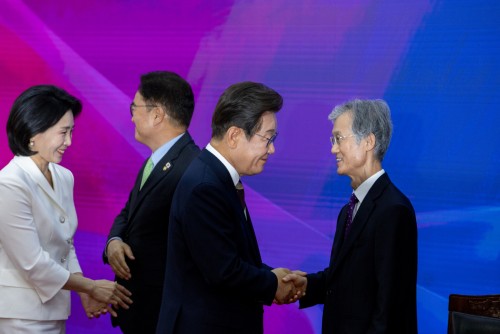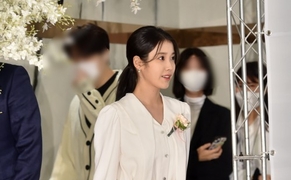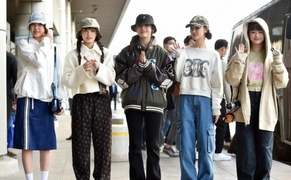 |
| President Lee Jae-myung greets Chief Justice Cho Hee-dae (first from right) during the inauguration ceremony of the 21st president at the National Assembly in Yeouido, Seoul, on June 4. / Source: National Assembly Press Photo Pool |
Major changes to South Korea’s judiciary appear imminent from day one of President Lee Jae-myung’s administration. On June 4, the Democratic Party pushed through a bill in the Legislation and Judiciary Committee to expand the number of Supreme Court justices. Observers also expect the new government to accelerate long-planned reforms to completely separate prosecutorial powers and convert the prosecution service into a purely indictment-focused body.
The proposal to increase the number of Supreme Court justices gained momentum after the Court recently overturned President Lee’s election law violation case with a guilty ruling. The issue has since emerged as a key item on the Democratic Party’s judicial reform agenda. Lee also pledged during his campaign to expand the Court and repeatedly expressed determination to complete judicial reform. Supporters argue that the measure will help ease chronic delays in appeal cases, though critics warn it could paralyze the Court’s functions, politicize the judiciary, and serve as a means for the administration to exert control over it.
Another controversial proposal involves introducing a quasi-fourth level of appeals, known as "judicial review petitions." This would treat court rulings as exercises of state power, thereby allowing them to be subject to constitutional challenges. Critics argue this move could also be used to rein in the judiciary. The bill is currently pending in the National Assembly.
Meanwhile, whether the so-called "complete removal of prosecutorial investigative powers", a long-standing goal since the Moon Jae-in administration, will be finalized under President Lee is drawing intense attention. Some expect the prosecution service to be converted into an indictment office, with new investigative bodies such as a Serious Crimes Investigation Agency taking over key investigative roles. This restructuring could also affect the role and status of other investigative agencies, such as the National Police Agency’s Criminal Investigation Bureau and the Corruption Investigation Office for High-ranking Officials.
Concerns about morale within the prosecution are also rising following the resignation of Seoul Central District Prosecutors’ Office chief Lee Chang-soo, which was accepted on June 3. Lee and Deputy Chief Cho Sang-won both unexpectedly stepped down two weeks before the June 3 election, citing health reasons. With Lee stepping down only three months after returning to duty, the prosecution is once again facing a leadership vacuum.
In addition, President Lee has pledged to strengthen democratic oversight of investigative agencies through new legislation on investigative procedures. He also plans to expand the unified legal profession system, allowing only experienced legal professionals to become prosecutors. Other reforms on the agenda during his term include introducing pre-review of search and seizure warrants and establishing a conditional release system to check prosecutorial power.
Most Read
-
1
-
2
-
3
-
4
-
5
-
6
-
7





















